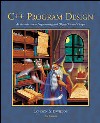 <a onClick="window.open('/olcweb/cgi/pluginpop.cgi?it=jpg::Jim Cohoon::/sites/dl/free/0072411635/30724/jim_cohoon.jpg','popWin', 'width=NaN,height=NaN,resizable,scrollbars');" href="#"><img valign="absmiddle" height="16" width="16" border="0" src="/olcweb/styles/shared/linkicons/image.gif">Jim Cohoon (19.0K)</a>Jim Cohoon <a onClick="window.open('/olcweb/cgi/pluginpop.cgi?it=jpg::Jim Cohoon::/sites/dl/free/0072411635/30724/jim_cohoon.jpg','popWin', 'width=NaN,height=NaN,resizable,scrollbars');" href="#"><img valign="absmiddle" height="16" width="16" border="0" src="/olcweb/styles/shared/linkicons/image.gif">Jim Cohoon (19.0K)</a>Jim Cohoon
Contact Information
Jim Cohoon received his B.S. in Mathematics from Ramapo
College, an M.S. in Computer Science from Pennsylvania State
University, and a Ph.D. in Computer Science from the University
of Minnesota in 1982. He is a former member of AT&T Bell
Laboratories and is currently an Associate Professor with the
Department of Computer Science at the University of Virginia in
Charlottesville, VA. He has directed 24 graduate students (4 PhD
and 20 MS) with another four in progress. His professional
interests include VLSI design automation algorithms,
computational geometry, probabilistic search, and computer
science education. He is the author or coauthor of four books and
more than 60 papers in these fields. He is a member of the ACM
Publications and SIG Boards and is past chair of the ACM Special
Interest Group on Design Automation (SIGDA) His honors include a
Fulbright Fellowship, his department's Best Teaching Award, and
SIGDA's Outstanding Service and Leadership
awards and two Design Automation Fellowships. Jim Cohoon has
been or is currently a member of the executive committees for
ASPDAC, Design Automation Conference, Date, and EuroDac. He also
served on the program committees for the Design Automation
Conference and is a current member for the ICCAD Conference. He
can be reached at cohoon@virginia.edu ResearchJiim Cohoon concentrates his research investigations on
important application areas such as VLSI design automation,
transport scheduling, and use of the Internet. His
interdisciplinary approach applies and extends non-traditional
techniques such as computational geometry, probabilistic search,
genetics, and parallel computing. He also generalizes the normal
solution domain to take full advantage of all available
capabilities. The result is a collection of state-of-the-art
tools that are both very practical and theoretically interesting
and which produce solutions that are markedly better than others.
For example, his research group's most recent tool is Spiffy and
Upstart, which together are a complete performance-oriented VLSI
layout tool for FPGAs. The tools solutions are approximately both
10% faster and smaller than previously possible. Current tood
development is exploring how to best produce 3D-FPGAs so that
whole systems can be rapidly prototyped.
Recent publications- J P. Cohoon and J. W. Davidson, Laboratory Manual for C++ Program Design, WCB/McGraw-Hill, 1998.
- J P. Cohoon and J. W. Davidson, C++ Program Design: An Introduction to
Programming and Object-Oriented Design, Irwin Publishing, 1997
- J. M. Varanelli, J. P. Cohoon, and W. N. Martin,
Population-oriented Simulated Annealing: an evolutionary
thermodynamic hybrid approach to Very Large-Scale
Integration Network Partitioning, Handbook of
Evolutionary Computation, Oxford University Press, to
appear.
- W. N. Martin, J. Lienig, and J. P. Cohoon,Parallel
Genetic Algorithms Based on Punctuated Equilibria,
Handbook of Evolutionary Computation, Oxford University
Press, to appear.
- M. Alexander, J. P. Cohoon, J. L. Ganley, and G. Robins,
Placement and Routing for High-Performance FPGA layout,
VLSI Design: International Journal of Custom-Chip Design,
Simulation, and Testing, to appear.
- J. L. Ganley and J. P. Cohoon, Improved Computation of
Optimal Rectilinear Steiner Tree Minimal Trees,
International Journal of Computational Geometry and
Applications, to appear.
- Rectilinear Steiner trees on a checkerboard, J. L. Ganley
and J. P. Cohoon, ACM Transactions on Design Automation
of Electronic System, October 1996.
- Alexander, M. J., Cohoon, J. P., Colflesh, J. L., Karro,
J., Peters, E. L. and Robins, G., Placement and Routing
for Three-Dimensional FPGAs, Fourth Canadian Workshop on
Field-Programmable Devices, Toronto, Canada, May, 1996,
pp. 11-18.
- Alexander, M. J., Cohoon, J. P., Colflesh, J. L., Karro,
J., Peters, E. L. and Robins, G., Physical Layout for
Three-Dimensional FPGAs, 1996 ACM/SIGDA Physical Design
Workshop, Reston, VA, April, 1996, pp. 142-149.
- J. P. Cohoon, and J. L. Ganley, Rectilinear
Interconnections In the Presence of Obstacles, in Routing
in Electronic Modules, Y. T. Wong and M. Pecht (Editors),
CRC Press, New York, NY, March 1996.
- Alexander, M. J., Cohoon, J. P., Ganley, J. L., and
Robins, G., Performance-Oriented Placement and Routing
for Field-Programmable Gate Arrays, Proc. European Design
Automation Conference, Brighton, England, September,
1995, pp. 80-85.
- Alexander, M. J., Cohoon, J. P., Colflesh, J. L., Karro,
J., and Robins, G., Three-Dimensional Field Programmable
Gate Arrays, Proc. IEEE International ASIC Conference,
Austin, TX, September 1995, pp. 253-256.
 <a onClick="window.open('/olcweb/cgi/pluginpop.cgi?it=jpg::Jack Davidson::/sites/dl/free/0072411635/30724/jwd1.jpg','popWin', 'width=NaN,height=NaN,resizable,scrollbars');" href="#"><img valign="absmiddle" height="16" width="16" border="0" src="/olcweb/styles/shared/linkicons/image.gif">Jack Davidson (23.0K)</a>Jack Davidson <a onClick="window.open('/olcweb/cgi/pluginpop.cgi?it=jpg::Jack Davidson::/sites/dl/free/0072411635/30724/jwd1.jpg','popWin', 'width=NaN,height=NaN,resizable,scrollbars');" href="#"><img valign="absmiddle" height="16" width="16" border="0" src="/olcweb/styles/shared/linkicons/image.gif">Jack Davidson (23.0K)</a>Jack Davidson
Contact Information
I am Professor in the Department
of Computer Science at the University
of Virginia. I have several on going research projects.
Please contact me if you are interested
in more information. - I was a principal investigator
of the National Compiler Infrastructure (NCI) project funded by DARPA
and NSF. Zephyr,
a tool suite for compiler and architecture research, is the centerpiece
of this work. The NCI work is continuing under both industrial and government
funding.
- I am also a principal investigator of a recently funded
NSF project to design and build new software development environments for
high-performance embedded applications (e.g., wireless video, digital cameras,
etc.). This is joint work with Doug
Jones of University of Illinois and
David Whalley of Florida
State University.
- I am also working on dynamic optimization with a focus
on power-aware computing. This is joint work with Bruce
Childers and Mary Lou Soffa
both of University of Pittsburgh.
I am also the coauthor of C++
Programming Design, a best-selling introductory programming textbook.
It includes a simple graphics package, called EzWindows,
that exposes beginning programmers to event-based programming.
|



 2002 McGraw-Hill Higher Education
2002 McGraw-Hill Higher Education

 2002 McGraw-Hill Higher Education
2002 McGraw-Hill Higher Education